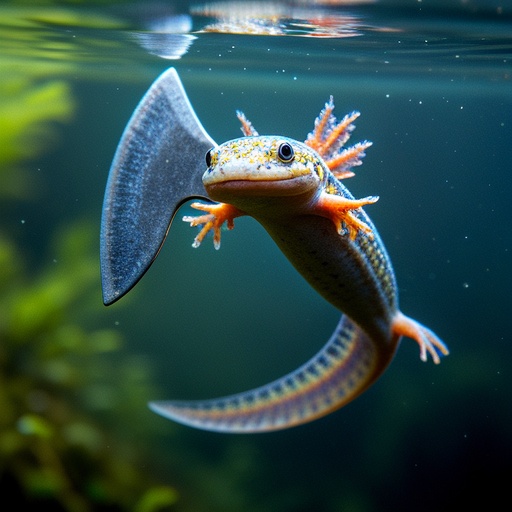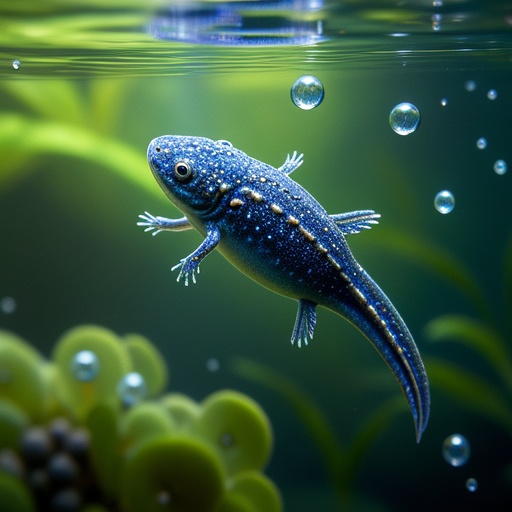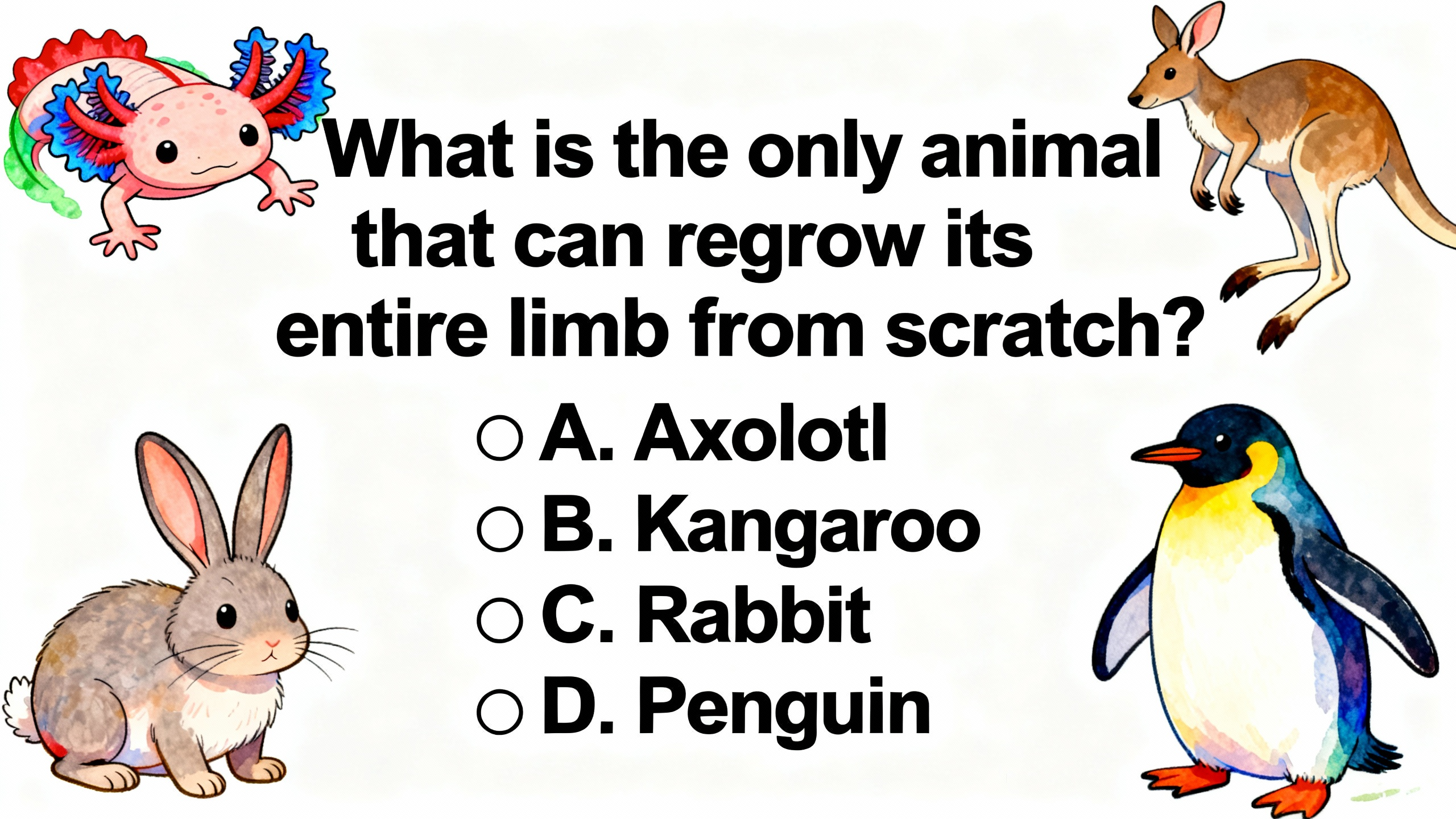The Axolotl: A Master of Limb Regeneration
 In the vast and diverse world of the animal kingdom, the axolotl stands out as a true marvel. It is the only well - known animal that can regrow its entire limb from scratch. Axolotls, often mistakenly referred to as Mexican walking fish, are actually a type of salamander native to the lakes of Mexico, specifically the ancient lake system of Xochimilco near Mexico City. These unique creatures have a distinct appearance, with their feathery external gills, which not only add to their charm but also serve as a vital respiratory organ. Their bodies are usually a shade of brown, gray, or pink, and they have a somewhat plump and cute look, making them a favorite among many animal enthusiasts.
In the vast and diverse world of the animal kingdom, the axolotl stands out as a true marvel. It is the only well - known animal that can regrow its entire limb from scratch. Axolotls, often mistakenly referred to as Mexican walking fish, are actually a type of salamander native to the lakes of Mexico, specifically the ancient lake system of Xochimilco near Mexico City. These unique creatures have a distinct appearance, with their feathery external gills, which not only add to their charm but also serve as a vital respiratory organ. Their bodies are usually a shade of brown, gray, or pink, and they have a somewhat plump and cute look, making them a favorite among many animal enthusiasts.
This remarkable ability to regenerate limbs is due to several unique biological features that set the axolotl apart from other animals. When an axolotl loses a limb, whether it's due to a predator attack, an accidental injury, or some other cause, a specialized group of cells called blastemal cells come into play. These cells are like a blank canvas in the world of cell biology. They have the potential to develop into various types of tissues such as muscle, bone, and nerve. Imagine a construction crew arriving at a building site with all the necessary materials and skills to rebuild a complex structure. That's what the blastemal cells do at the site of the injury.
Once the limb is lost, the axolotl's body immediately starts a series of events to initiate the regeneration process. First, the wound at the site of the lost limb begins to heal rapidly. This is not just a simple closing of the wound but a carefully orchestrated process. The skin cells around the wound start to divide and migrate to cover the open area, forming a protective layer. At the same time, the blastemal cells start to accumulate at the site of the injury. They are like little soldiers gathering at a strategic point on the battlefield. These cells then start to proliferate rapidly, multiplying in number at an astonishing rate.
The axolotl's body is able to precisely control the growth and differentiation of these cells, ensuring that the new limb grows in the correct shape and proportion. This is an incredibly complex process that involves a multitude of genetic and molecular signals. It's like a well - choreographed dance where each step is carefully planned and executed. For example, certain genes are activated that determine the length of the limb, the number of joints, and the shape of the digits. These genes send out molecular signals that tell the blastemal cells what type of tissue to become and where to go. The development of the limb starts from the base and gradually progresses towards the tip, much like building a tower from the ground up. Each part of the limb is formed in a sequential and coordinated manner, ensuring that the new limb is a perfect replica of the one that was lost.
 To better understand the significance of this process, let's compare it to the situation in humans. When a human loses a limb, the body's response is very different. Instead of regenerating the limb, the wound heals by forming scar tissue. Scar tissue is a fibrous tissue that helps to close the wound but does not have the same functionality as the original limb. In humans, the cells at the site of the injury do not have the ability to transform into different types of tissues to rebuild the limb. This is in stark contrast to the axolotl, where the blastemal cells can differentiate into muscle cells that can contract and move, bone cells that provide structure and support, and nerve cells that allow for sensation and movement control.
To better understand the significance of this process, let's compare it to the situation in humans. When a human loses a limb, the body's response is very different. Instead of regenerating the limb, the wound heals by forming scar tissue. Scar tissue is a fibrous tissue that helps to close the wound but does not have the same functionality as the original limb. In humans, the cells at the site of the injury do not have the ability to transform into different types of tissues to rebuild the limb. This is in stark contrast to the axolotl, where the blastemal cells can differentiate into muscle cells that can contract and move, bone cells that provide structure and support, and nerve cells that allow for sensation and movement control.
Moreover, the axolotl's immune system also plays a crucial role in the regeneration process. In many animals, including humans, when an injury occurs, the immune system kicks into high gear. It sends out a large number of immune cells to fight off any potential pathogens that might enter the body through the wound. This immune response often involves inflammation, which is the body's way of protecting itself. However, excessive inflammation can actually be harmful to the regeneration process. In the axolotl, the immune response is less aggressive. It's like a security system that is set to a lower level of alert. This lack of excessive inflammation means that the cells can focus on rebuilding the limb rather than dealing with a large - scale immune reaction.
Let's take a closer look at how the axolotl's immune system works during limb regeneration. When the injury occurs, the immune cells in the axolotl do respond, but they do so in a more controlled manner. Instead of causing a massive inflammatory response that can damage the surrounding tissues, the immune cells help to clear away any debris at the site of the injury and prevent infection. They act more like a cleaning crew and a security guard, keeping the area safe and clean for the regeneration process to take place. This is in contrast to the situation in humans, where the immune response can sometimes lead to the formation of scar tissue and can even interfere with the normal healing process.
The axolotl's ability to regrow limbs has fascinated scientists for a long time. It holds great potential for understanding tissue regeneration in other animals, including humans. For example, if scientists can figure out how the axolotl's blastemal cells work and how the genetic and molecular signals control the regeneration process, they might be able to apply this knowledge to develop new medical treatments for injuries and diseases that affect the musculoskeletal system. In humans, there are many conditions such as bone fractures that take a long time to heal, and in some cases, the healing may not be complete. By studying the axolotl, scientists might be able to find ways to enhance the body's natural healing abilities and promote better regeneration of damaged tissues.
Another area where the axolotl's regeneration ability could have an impact is in the field of regenerative medicine. Imagine being able to grow new limbs or organs for patients who have lost them due to injury or disease. This is still a long - term goal, but the axolotl provides a valuable model for research. Scientists are also looking at the axolotl's immune system to see if they can learn how to modulate the immune response in humans to create a more favorable environment for tissue repair. For example, in cases of chronic inflammation in humans, which can lead to many diseases such as arthritis, understanding the axolotl's immune system could potentially lead to new treatments that reduce inflammation and promote tissue regeneration.
However, the axolotl is facing many challenges in the wild. The lakes of Xochimilco, its natural habitat, are under threat due to pollution, urbanization, and the introduction of non - native species. These factors are causing a decline in the axolotl population. It's a race against time for scientists to study these amazing creatures and unlock the secrets of their limb regeneration ability before it's too late. Conservation efforts are also crucial to ensure that the axolotl continues to thrive in its natural environment and that future generations can continue to be amazed by its unique biological features.
In conclusion, the axolotl is a truly remarkable animal. Its ability to regenerate limbs is a testament to the wonders of nature. By studying the axolotl, we not only gain a better understanding of the complex processes of tissue regeneration but also open up new possibilities for medical advancements. It's a reminder that there is still so much we don't know about the natural world and that every species has something unique to teach us.










